UK Law-Making Process: Direct Impact on Commercial Organizations
VerifiedAdded on 2023/06/06
|10
|3079
|151
Report
AI Summary
This report provides a comprehensive overview of the UK legal system, including the classifications and sources of law, with a focus on their impact on commercial organizations. It identifies the hierarchy of principal law sources in the English Legal System, such as legislation, common law, and human rights law, explaining their characteristics and influence. The report discusses how the UK law-making process, particularly contract law, directly affects commercial entities, emphasizing the essential elements of a legally enforceable contract. It also addresses the implications of these laws on multilingual organizations, highlighting the importance of non-discrimination and cross-cultural communication. Desklib offers further resources and solved assignments for students studying business law.
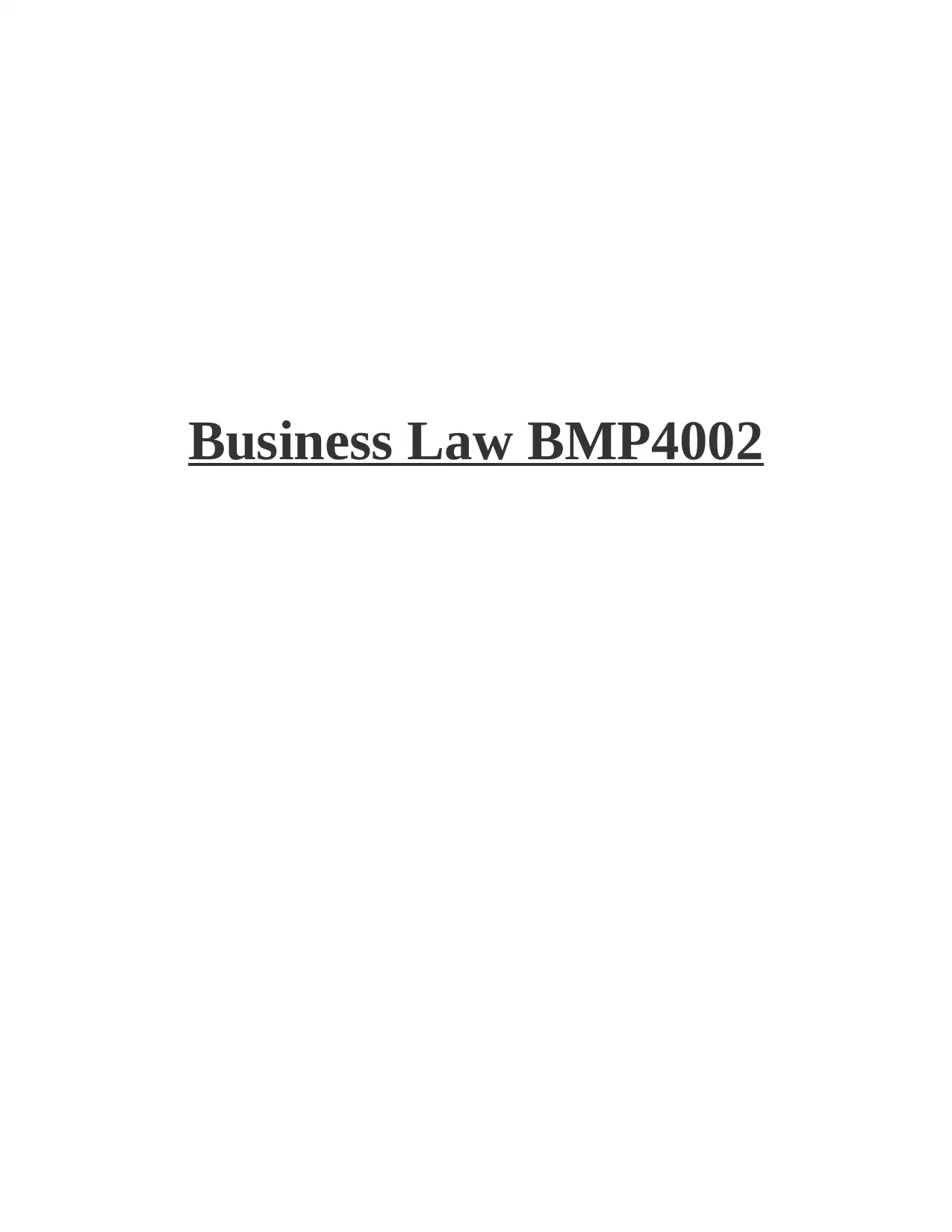
Business Law BMP4002
Paraphrase This Document
Need a fresh take? Get an instant paraphrase of this document with our AI Paraphraser
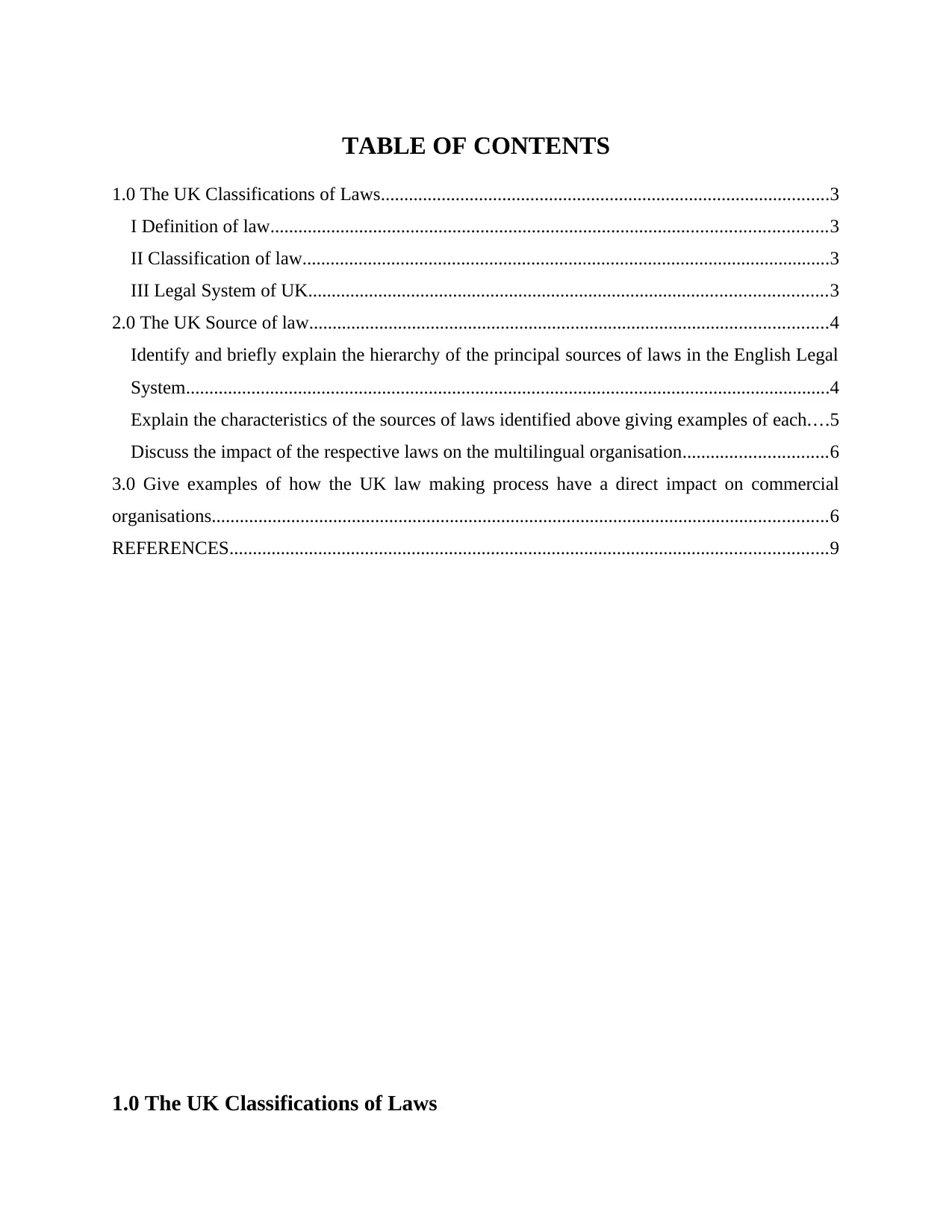
TABLE OF CONTENTS
1.0 The UK Classifications of Laws................................................................................................3
I Definition of law.......................................................................................................................3
II Classification of law.................................................................................................................3
III Legal System of UK...............................................................................................................3
2.0 The UK Source of law...............................................................................................................4
Identify and briefly explain the hierarchy of the principal sources of laws in the English Legal
System..........................................................................................................................................4
Explain the characteristics of the sources of laws identified above giving examples of each....5
Discuss the impact of the respective laws on the multilingual organisation...............................6
3.0 Give examples of how the UK law making process have a direct impact on commercial
organisations....................................................................................................................................6
REFERENCES................................................................................................................................9
1.0 The UK Classifications of Laws
1.0 The UK Classifications of Laws................................................................................................3
I Definition of law.......................................................................................................................3
II Classification of law.................................................................................................................3
III Legal System of UK...............................................................................................................3
2.0 The UK Source of law...............................................................................................................4
Identify and briefly explain the hierarchy of the principal sources of laws in the English Legal
System..........................................................................................................................................4
Explain the characteristics of the sources of laws identified above giving examples of each....5
Discuss the impact of the respective laws on the multilingual organisation...............................6
3.0 Give examples of how the UK law making process have a direct impact on commercial
organisations....................................................................................................................................6
REFERENCES................................................................................................................................9
1.0 The UK Classifications of Laws
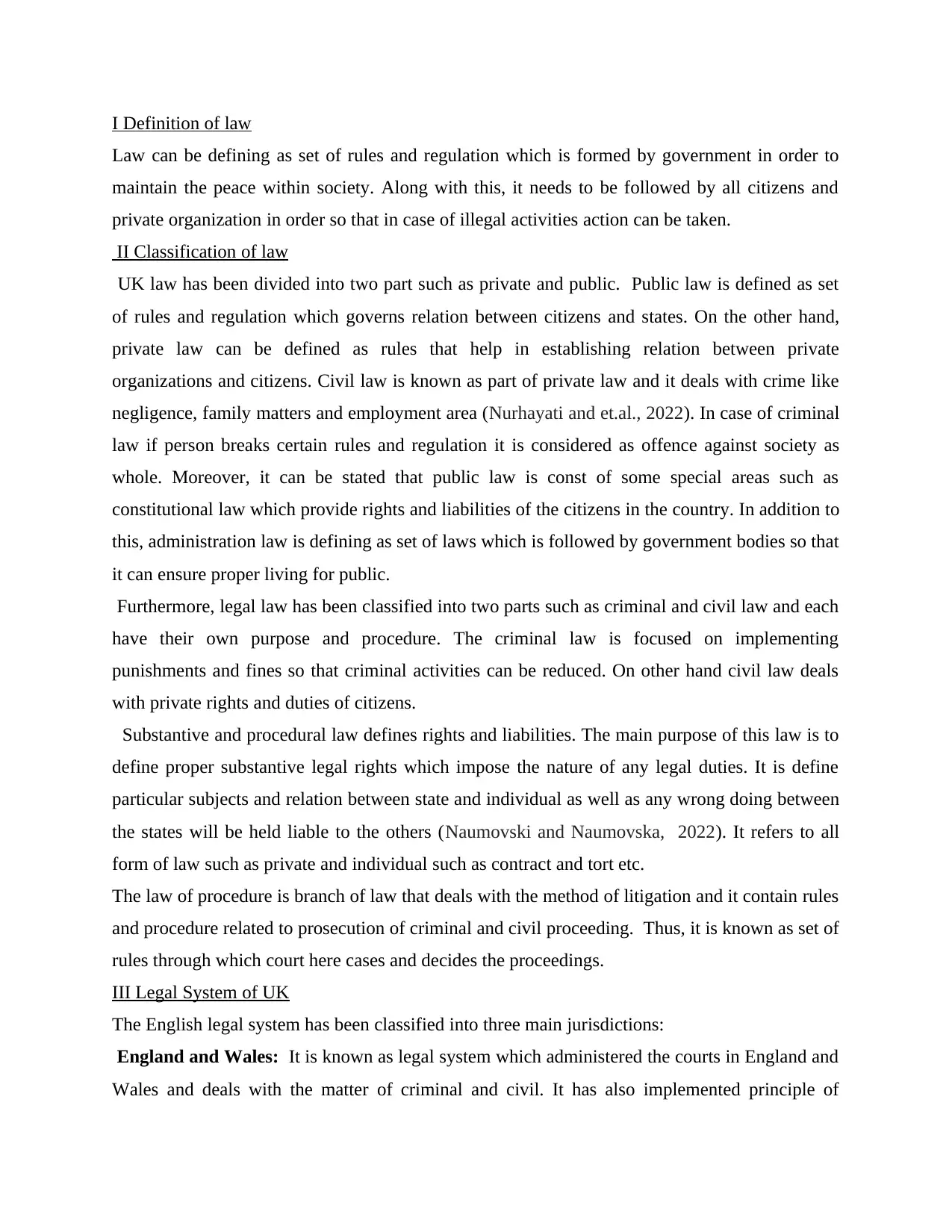
I Definition of law
Law can be defining as set of rules and regulation which is formed by government in order to
maintain the peace within society. Along with this, it needs to be followed by all citizens and
private organization in order so that in case of illegal activities action can be taken.
II Classification of law
UK law has been divided into two part such as private and public. Public law is defined as set
of rules and regulation which governs relation between citizens and states. On the other hand,
private law can be defined as rules that help in establishing relation between private
organizations and citizens. Civil law is known as part of private law and it deals with crime like
negligence, family matters and employment area (Nurhayati and et.al., 2022). In case of criminal
law if person breaks certain rules and regulation it is considered as offence against society as
whole. Moreover, it can be stated that public law is const of some special areas such as
constitutional law which provide rights and liabilities of the citizens in the country. In addition to
this, administration law is defining as set of laws which is followed by government bodies so that
it can ensure proper living for public.
Furthermore, legal law has been classified into two parts such as criminal and civil law and each
have their own purpose and procedure. The criminal law is focused on implementing
punishments and fines so that criminal activities can be reduced. On other hand civil law deals
with private rights and duties of citizens.
Substantive and procedural law defines rights and liabilities. The main purpose of this law is to
define proper substantive legal rights which impose the nature of any legal duties. It is define
particular subjects and relation between state and individual as well as any wrong doing between
the states will be held liable to the others (Naumovski and Naumovska, 2022). It refers to all
form of law such as private and individual such as contract and tort etc.
The law of procedure is branch of law that deals with the method of litigation and it contain rules
and procedure related to prosecution of criminal and civil proceeding. Thus, it is known as set of
rules through which court here cases and decides the proceedings.
III Legal System of UK
The English legal system has been classified into three main jurisdictions:
England and Wales: It is known as legal system which administered the courts in England and
Wales and deals with the matter of criminal and civil. It has also implemented principle of
Law can be defining as set of rules and regulation which is formed by government in order to
maintain the peace within society. Along with this, it needs to be followed by all citizens and
private organization in order so that in case of illegal activities action can be taken.
II Classification of law
UK law has been divided into two part such as private and public. Public law is defined as set
of rules and regulation which governs relation between citizens and states. On the other hand,
private law can be defined as rules that help in establishing relation between private
organizations and citizens. Civil law is known as part of private law and it deals with crime like
negligence, family matters and employment area (Nurhayati and et.al., 2022). In case of criminal
law if person breaks certain rules and regulation it is considered as offence against society as
whole. Moreover, it can be stated that public law is const of some special areas such as
constitutional law which provide rights and liabilities of the citizens in the country. In addition to
this, administration law is defining as set of laws which is followed by government bodies so that
it can ensure proper living for public.
Furthermore, legal law has been classified into two parts such as criminal and civil law and each
have their own purpose and procedure. The criminal law is focused on implementing
punishments and fines so that criminal activities can be reduced. On other hand civil law deals
with private rights and duties of citizens.
Substantive and procedural law defines rights and liabilities. The main purpose of this law is to
define proper substantive legal rights which impose the nature of any legal duties. It is define
particular subjects and relation between state and individual as well as any wrong doing between
the states will be held liable to the others (Naumovski and Naumovska, 2022). It refers to all
form of law such as private and individual such as contract and tort etc.
The law of procedure is branch of law that deals with the method of litigation and it contain rules
and procedure related to prosecution of criminal and civil proceeding. Thus, it is known as set of
rules through which court here cases and decides the proceedings.
III Legal System of UK
The English legal system has been classified into three main jurisdictions:
England and Wales: It is known as legal system which administered the courts in England and
Wales and deals with the matter of criminal and civil. It has also implemented principle of
⊘ This is a preview!⊘
Do you want full access?
Subscribe today to unlock all pages.

Trusted by 1+ million students worldwide
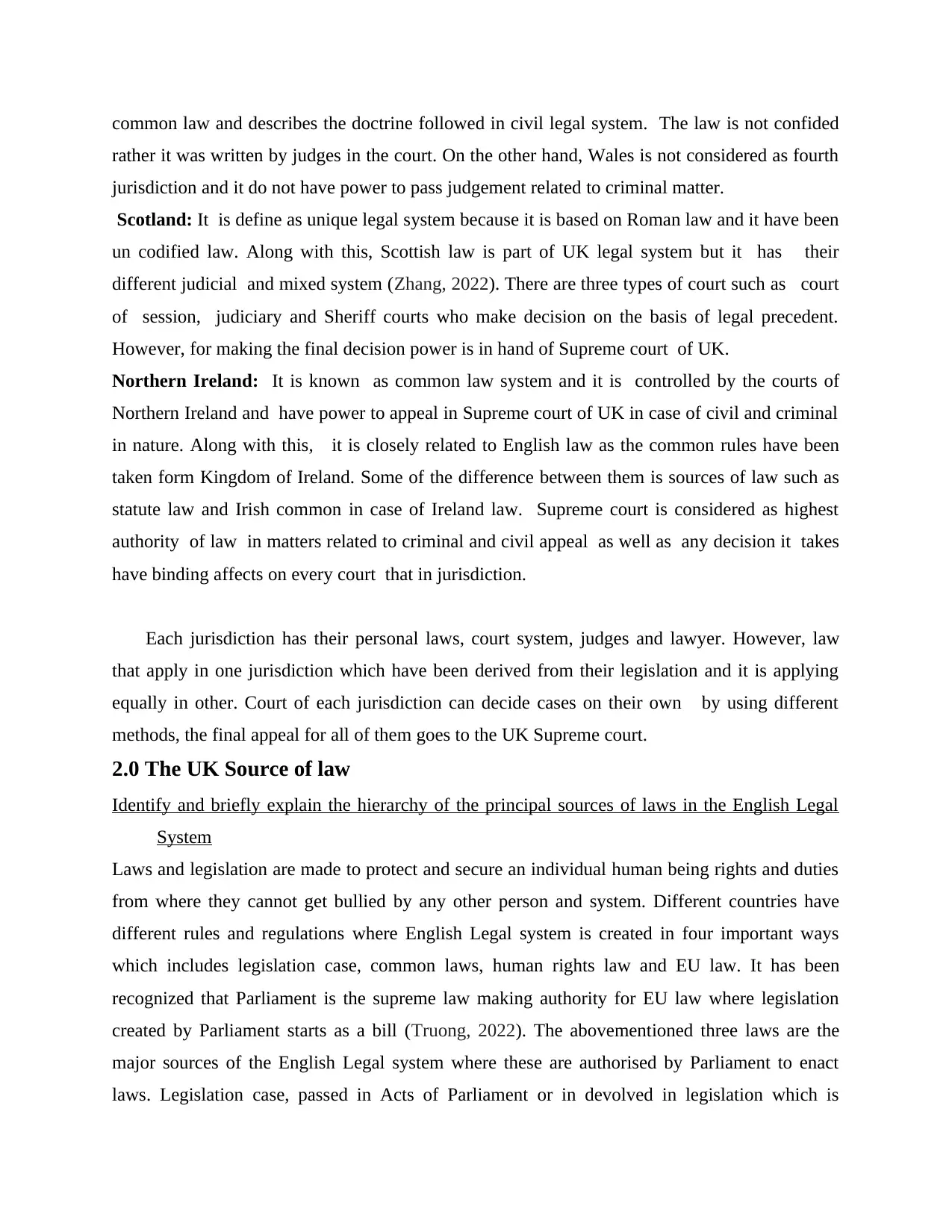
common law and describes the doctrine followed in civil legal system. The law is not confided
rather it was written by judges in the court. On the other hand, Wales is not considered as fourth
jurisdiction and it do not have power to pass judgement related to criminal matter.
Scotland: It is define as unique legal system because it is based on Roman law and it have been
un codified law. Along with this, Scottish law is part of UK legal system but it has their
different judicial and mixed system (Zhang, 2022). There are three types of court such as court
of session, judiciary and Sheriff courts who make decision on the basis of legal precedent.
However, for making the final decision power is in hand of Supreme court of UK.
Northern Ireland: It is known as common law system and it is controlled by the courts of
Northern Ireland and have power to appeal in Supreme court of UK in case of civil and criminal
in nature. Along with this, it is closely related to English law as the common rules have been
taken form Kingdom of Ireland. Some of the difference between them is sources of law such as
statute law and Irish common in case of Ireland law. Supreme court is considered as highest
authority of law in matters related to criminal and civil appeal as well as any decision it takes
have binding affects on every court that in jurisdiction.
Each jurisdiction has their personal laws, court system, judges and lawyer. However, law
that apply in one jurisdiction which have been derived from their legislation and it is applying
equally in other. Court of each jurisdiction can decide cases on their own by using different
methods, the final appeal for all of them goes to the UK Supreme court.
2.0 The UK Source of law
Identify and briefly explain the hierarchy of the principal sources of laws in the English Legal
System
Laws and legislation are made to protect and secure an individual human being rights and duties
from where they cannot get bullied by any other person and system. Different countries have
different rules and regulations where English Legal system is created in four important ways
which includes legislation case, common laws, human rights law and EU law. It has been
recognized that Parliament is the supreme law making authority for EU law where legislation
created by Parliament starts as a bill (Truong, 2022). The abovementioned three laws are the
major sources of the English Legal system where these are authorised by Parliament to enact
laws. Legislation case, passed in Acts of Parliament or in devolved in legislation which is
rather it was written by judges in the court. On the other hand, Wales is not considered as fourth
jurisdiction and it do not have power to pass judgement related to criminal matter.
Scotland: It is define as unique legal system because it is based on Roman law and it have been
un codified law. Along with this, Scottish law is part of UK legal system but it has their
different judicial and mixed system (Zhang, 2022). There are three types of court such as court
of session, judiciary and Sheriff courts who make decision on the basis of legal precedent.
However, for making the final decision power is in hand of Supreme court of UK.
Northern Ireland: It is known as common law system and it is controlled by the courts of
Northern Ireland and have power to appeal in Supreme court of UK in case of civil and criminal
in nature. Along with this, it is closely related to English law as the common rules have been
taken form Kingdom of Ireland. Some of the difference between them is sources of law such as
statute law and Irish common in case of Ireland law. Supreme court is considered as highest
authority of law in matters related to criminal and civil appeal as well as any decision it takes
have binding affects on every court that in jurisdiction.
Each jurisdiction has their personal laws, court system, judges and lawyer. However, law
that apply in one jurisdiction which have been derived from their legislation and it is applying
equally in other. Court of each jurisdiction can decide cases on their own by using different
methods, the final appeal for all of them goes to the UK Supreme court.
2.0 The UK Source of law
Identify and briefly explain the hierarchy of the principal sources of laws in the English Legal
System
Laws and legislation are made to protect and secure an individual human being rights and duties
from where they cannot get bullied by any other person and system. Different countries have
different rules and regulations where English Legal system is created in four important ways
which includes legislation case, common laws, human rights law and EU law. It has been
recognized that Parliament is the supreme law making authority for EU law where legislation
created by Parliament starts as a bill (Truong, 2022). The abovementioned three laws are the
major sources of the English Legal system where these are authorised by Parliament to enact
laws. Legislation case, passed in Acts of Parliament or in devolved in legislation which is
Paraphrase This Document
Need a fresh take? Get an instant paraphrase of this document with our AI Paraphraser
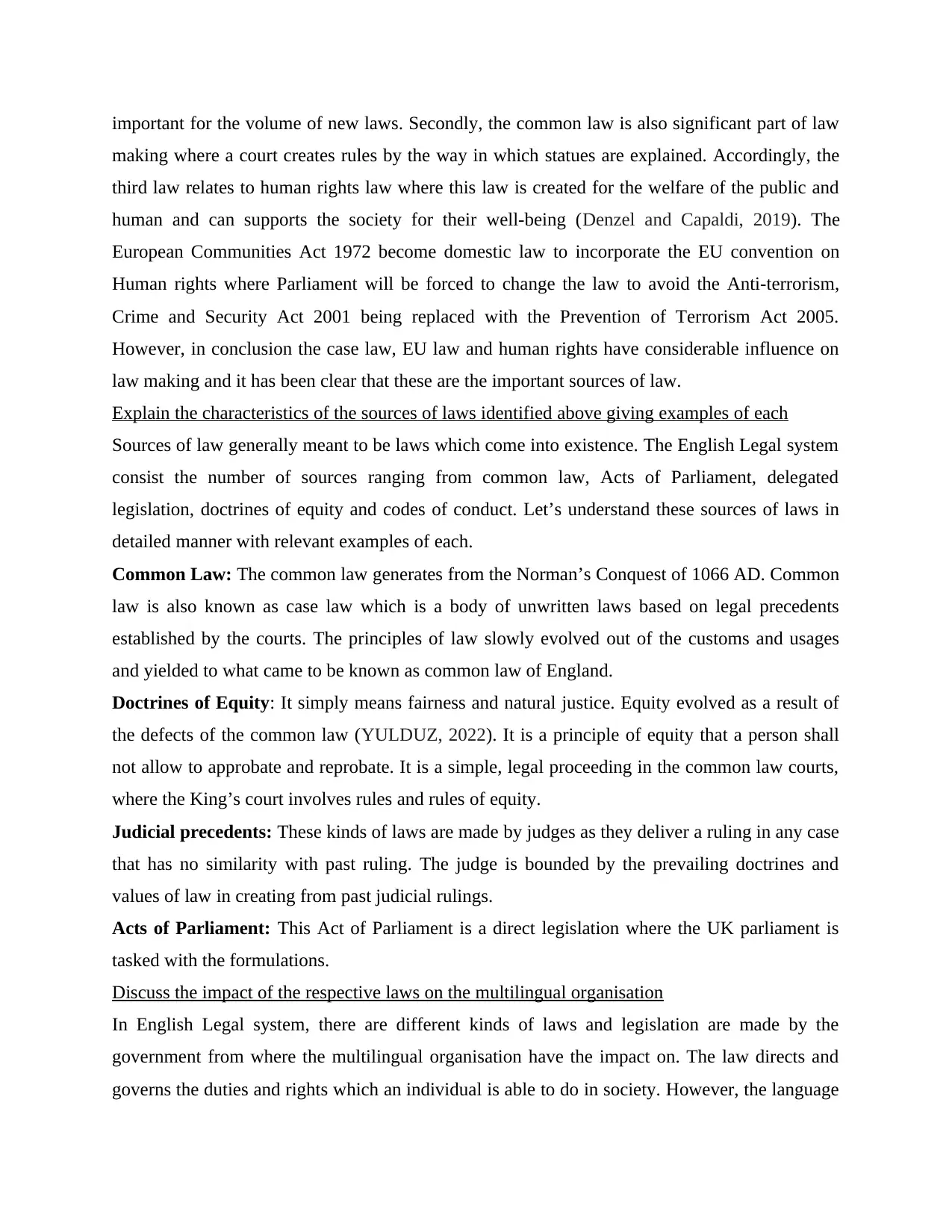
important for the volume of new laws. Secondly, the common law is also significant part of law
making where a court creates rules by the way in which statues are explained. Accordingly, the
third law relates to human rights law where this law is created for the welfare of the public and
human and can supports the society for their well-being (Denzel and Capaldi, 2019). The
European Communities Act 1972 become domestic law to incorporate the EU convention on
Human rights where Parliament will be forced to change the law to avoid the Anti-terrorism,
Crime and Security Act 2001 being replaced with the Prevention of Terrorism Act 2005.
However, in conclusion the case law, EU law and human rights have considerable influence on
law making and it has been clear that these are the important sources of law.
Explain the characteristics of the sources of laws identified above giving examples of each
Sources of law generally meant to be laws which come into existence. The English Legal system
consist the number of sources ranging from common law, Acts of Parliament, delegated
legislation, doctrines of equity and codes of conduct. Let’s understand these sources of laws in
detailed manner with relevant examples of each.
Common Law: The common law generates from the Norman’s Conquest of 1066 AD. Common
law is also known as case law which is a body of unwritten laws based on legal precedents
established by the courts. The principles of law slowly evolved out of the customs and usages
and yielded to what came to be known as common law of England.
Doctrines of Equity: It simply means fairness and natural justice. Equity evolved as a result of
the defects of the common law (YULDUZ, 2022). It is a principle of equity that a person shall
not allow to approbate and reprobate. It is a simple, legal proceeding in the common law courts,
where the King’s court involves rules and rules of equity.
Judicial precedents: These kinds of laws are made by judges as they deliver a ruling in any case
that has no similarity with past ruling. The judge is bounded by the prevailing doctrines and
values of law in creating from past judicial rulings.
Acts of Parliament: This Act of Parliament is a direct legislation where the UK parliament is
tasked with the formulations.
Discuss the impact of the respective laws on the multilingual organisation
In English Legal system, there are different kinds of laws and legislation are made by the
government from where the multilingual organisation have the impact on. The law directs and
governs the duties and rights which an individual is able to do in society. However, the language
making where a court creates rules by the way in which statues are explained. Accordingly, the
third law relates to human rights law where this law is created for the welfare of the public and
human and can supports the society for their well-being (Denzel and Capaldi, 2019). The
European Communities Act 1972 become domestic law to incorporate the EU convention on
Human rights where Parliament will be forced to change the law to avoid the Anti-terrorism,
Crime and Security Act 2001 being replaced with the Prevention of Terrorism Act 2005.
However, in conclusion the case law, EU law and human rights have considerable influence on
law making and it has been clear that these are the important sources of law.
Explain the characteristics of the sources of laws identified above giving examples of each
Sources of law generally meant to be laws which come into existence. The English Legal system
consist the number of sources ranging from common law, Acts of Parliament, delegated
legislation, doctrines of equity and codes of conduct. Let’s understand these sources of laws in
detailed manner with relevant examples of each.
Common Law: The common law generates from the Norman’s Conquest of 1066 AD. Common
law is also known as case law which is a body of unwritten laws based on legal precedents
established by the courts. The principles of law slowly evolved out of the customs and usages
and yielded to what came to be known as common law of England.
Doctrines of Equity: It simply means fairness and natural justice. Equity evolved as a result of
the defects of the common law (YULDUZ, 2022). It is a principle of equity that a person shall
not allow to approbate and reprobate. It is a simple, legal proceeding in the common law courts,
where the King’s court involves rules and rules of equity.
Judicial precedents: These kinds of laws are made by judges as they deliver a ruling in any case
that has no similarity with past ruling. The judge is bounded by the prevailing doctrines and
values of law in creating from past judicial rulings.
Acts of Parliament: This Act of Parliament is a direct legislation where the UK parliament is
tasked with the formulations.
Discuss the impact of the respective laws on the multilingual organisation
In English Legal system, there are different kinds of laws and legislation are made by the
government from where the multilingual organisation have the impact on. The law directs and
governs the duties and rights which an individual is able to do in society. However, the language
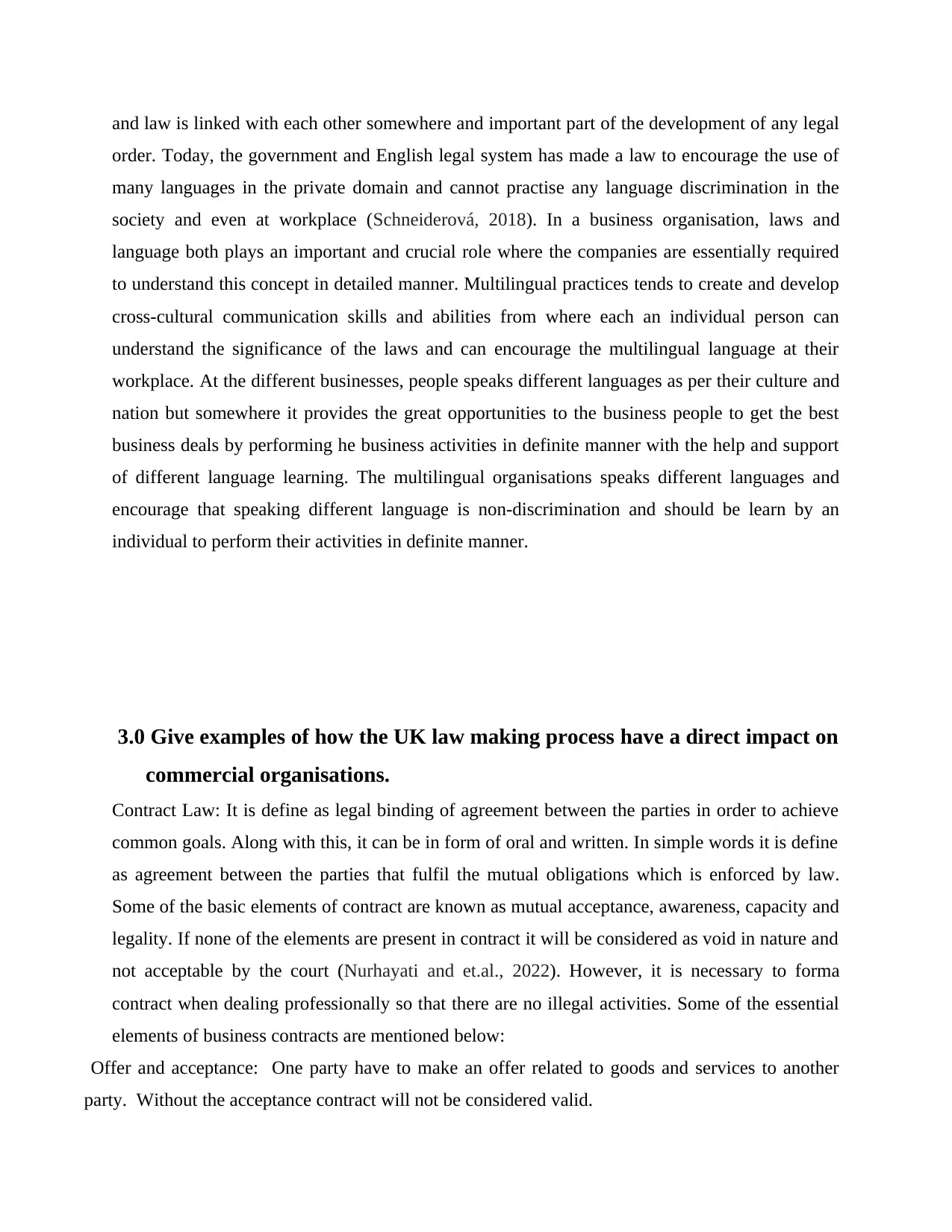
and law is linked with each other somewhere and important part of the development of any legal
order. Today, the government and English legal system has made a law to encourage the use of
many languages in the private domain and cannot practise any language discrimination in the
society and even at workplace (Schneiderová, 2018). In a business organisation, laws and
language both plays an important and crucial role where the companies are essentially required
to understand this concept in detailed manner. Multilingual practices tends to create and develop
cross-cultural communication skills and abilities from where each an individual person can
understand the significance of the laws and can encourage the multilingual language at their
workplace. At the different businesses, people speaks different languages as per their culture and
nation but somewhere it provides the great opportunities to the business people to get the best
business deals by performing he business activities in definite manner with the help and support
of different language learning. The multilingual organisations speaks different languages and
encourage that speaking different language is non-discrimination and should be learn by an
individual to perform their activities in definite manner.
3.0 Give examples of how the UK law making process have a direct impact on
commercial organisations.
Contract Law: It is define as legal binding of agreement between the parties in order to achieve
common goals. Along with this, it can be in form of oral and written. In simple words it is define
as agreement between the parties that fulfil the mutual obligations which is enforced by law.
Some of the basic elements of contract are known as mutual acceptance, awareness, capacity and
legality. If none of the elements are present in contract it will be considered as void in nature and
not acceptable by the court (Nurhayati and et.al., 2022). However, it is necessary to forma
contract when dealing professionally so that there are no illegal activities. Some of the essential
elements of business contracts are mentioned below:
Offer and acceptance: One party have to make an offer related to goods and services to another
party. Without the acceptance contract will not be considered valid.
order. Today, the government and English legal system has made a law to encourage the use of
many languages in the private domain and cannot practise any language discrimination in the
society and even at workplace (Schneiderová, 2018). In a business organisation, laws and
language both plays an important and crucial role where the companies are essentially required
to understand this concept in detailed manner. Multilingual practices tends to create and develop
cross-cultural communication skills and abilities from where each an individual person can
understand the significance of the laws and can encourage the multilingual language at their
workplace. At the different businesses, people speaks different languages as per their culture and
nation but somewhere it provides the great opportunities to the business people to get the best
business deals by performing he business activities in definite manner with the help and support
of different language learning. The multilingual organisations speaks different languages and
encourage that speaking different language is non-discrimination and should be learn by an
individual to perform their activities in definite manner.
3.0 Give examples of how the UK law making process have a direct impact on
commercial organisations.
Contract Law: It is define as legal binding of agreement between the parties in order to achieve
common goals. Along with this, it can be in form of oral and written. In simple words it is define
as agreement between the parties that fulfil the mutual obligations which is enforced by law.
Some of the basic elements of contract are known as mutual acceptance, awareness, capacity and
legality. If none of the elements are present in contract it will be considered as void in nature and
not acceptable by the court (Nurhayati and et.al., 2022). However, it is necessary to forma
contract when dealing professionally so that there are no illegal activities. Some of the essential
elements of business contracts are mentioned below:
Offer and acceptance: One party have to make an offer related to goods and services to another
party. Without the acceptance contract will not be considered valid.
⊘ This is a preview!⊘
Do you want full access?
Subscribe today to unlock all pages.

Trusted by 1+ million students worldwide
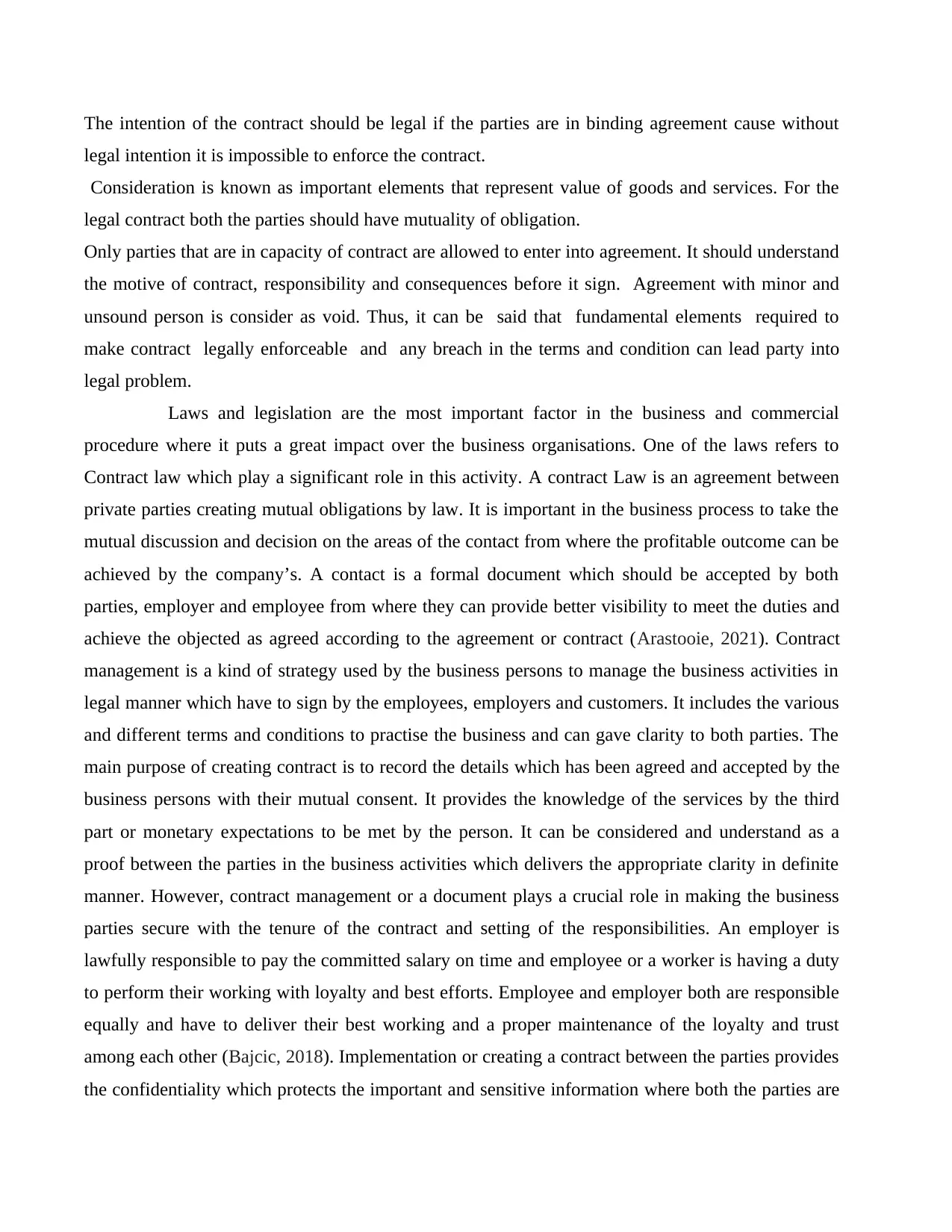
The intention of the contract should be legal if the parties are in binding agreement cause without
legal intention it is impossible to enforce the contract.
Consideration is known as important elements that represent value of goods and services. For the
legal contract both the parties should have mutuality of obligation.
Only parties that are in capacity of contract are allowed to enter into agreement. It should understand
the motive of contract, responsibility and consequences before it sign. Agreement with minor and
unsound person is consider as void. Thus, it can be said that fundamental elements required to
make contract legally enforceable and any breach in the terms and condition can lead party into
legal problem.
Laws and legislation are the most important factor in the business and commercial
procedure where it puts a great impact over the business organisations. One of the laws refers to
Contract law which play a significant role in this activity. A contract Law is an agreement between
private parties creating mutual obligations by law. It is important in the business process to take the
mutual discussion and decision on the areas of the contact from where the profitable outcome can be
achieved by the company’s. A contact is a formal document which should be accepted by both
parties, employer and employee from where they can provide better visibility to meet the duties and
achieve the objected as agreed according to the agreement or contract (Arastooie, 2021). Contract
management is a kind of strategy used by the business persons to manage the business activities in
legal manner which have to sign by the employees, employers and customers. It includes the various
and different terms and conditions to practise the business and can gave clarity to both parties. The
main purpose of creating contract is to record the details which has been agreed and accepted by the
business persons with their mutual consent. It provides the knowledge of the services by the third
part or monetary expectations to be met by the person. It can be considered and understand as a
proof between the parties in the business activities which delivers the appropriate clarity in definite
manner. However, contract management or a document plays a crucial role in making the business
parties secure with the tenure of the contract and setting of the responsibilities. An employer is
lawfully responsible to pay the committed salary on time and employee or a worker is having a duty
to perform their working with loyalty and best efforts. Employee and employer both are responsible
equally and have to deliver their best working and a proper maintenance of the loyalty and trust
among each other (Bajcic, 2018). Implementation or creating a contract between the parties provides
the confidentiality which protects the important and sensitive information where both the parties are
legal intention it is impossible to enforce the contract.
Consideration is known as important elements that represent value of goods and services. For the
legal contract both the parties should have mutuality of obligation.
Only parties that are in capacity of contract are allowed to enter into agreement. It should understand
the motive of contract, responsibility and consequences before it sign. Agreement with minor and
unsound person is consider as void. Thus, it can be said that fundamental elements required to
make contract legally enforceable and any breach in the terms and condition can lead party into
legal problem.
Laws and legislation are the most important factor in the business and commercial
procedure where it puts a great impact over the business organisations. One of the laws refers to
Contract law which play a significant role in this activity. A contract Law is an agreement between
private parties creating mutual obligations by law. It is important in the business process to take the
mutual discussion and decision on the areas of the contact from where the profitable outcome can be
achieved by the company’s. A contact is a formal document which should be accepted by both
parties, employer and employee from where they can provide better visibility to meet the duties and
achieve the objected as agreed according to the agreement or contract (Arastooie, 2021). Contract
management is a kind of strategy used by the business persons to manage the business activities in
legal manner which have to sign by the employees, employers and customers. It includes the various
and different terms and conditions to practise the business and can gave clarity to both parties. The
main purpose of creating contract is to record the details which has been agreed and accepted by the
business persons with their mutual consent. It provides the knowledge of the services by the third
part or monetary expectations to be met by the person. It can be considered and understand as a
proof between the parties in the business activities which delivers the appropriate clarity in definite
manner. However, contract management or a document plays a crucial role in making the business
parties secure with the tenure of the contract and setting of the responsibilities. An employer is
lawfully responsible to pay the committed salary on time and employee or a worker is having a duty
to perform their working with loyalty and best efforts. Employee and employer both are responsible
equally and have to deliver their best working and a proper maintenance of the loyalty and trust
among each other (Bajcic, 2018). Implementation or creating a contract between the parties provides
the confidentiality which protects the important and sensitive information where both the parties are
Paraphrase This Document
Need a fresh take? Get an instant paraphrase of this document with our AI Paraphraser
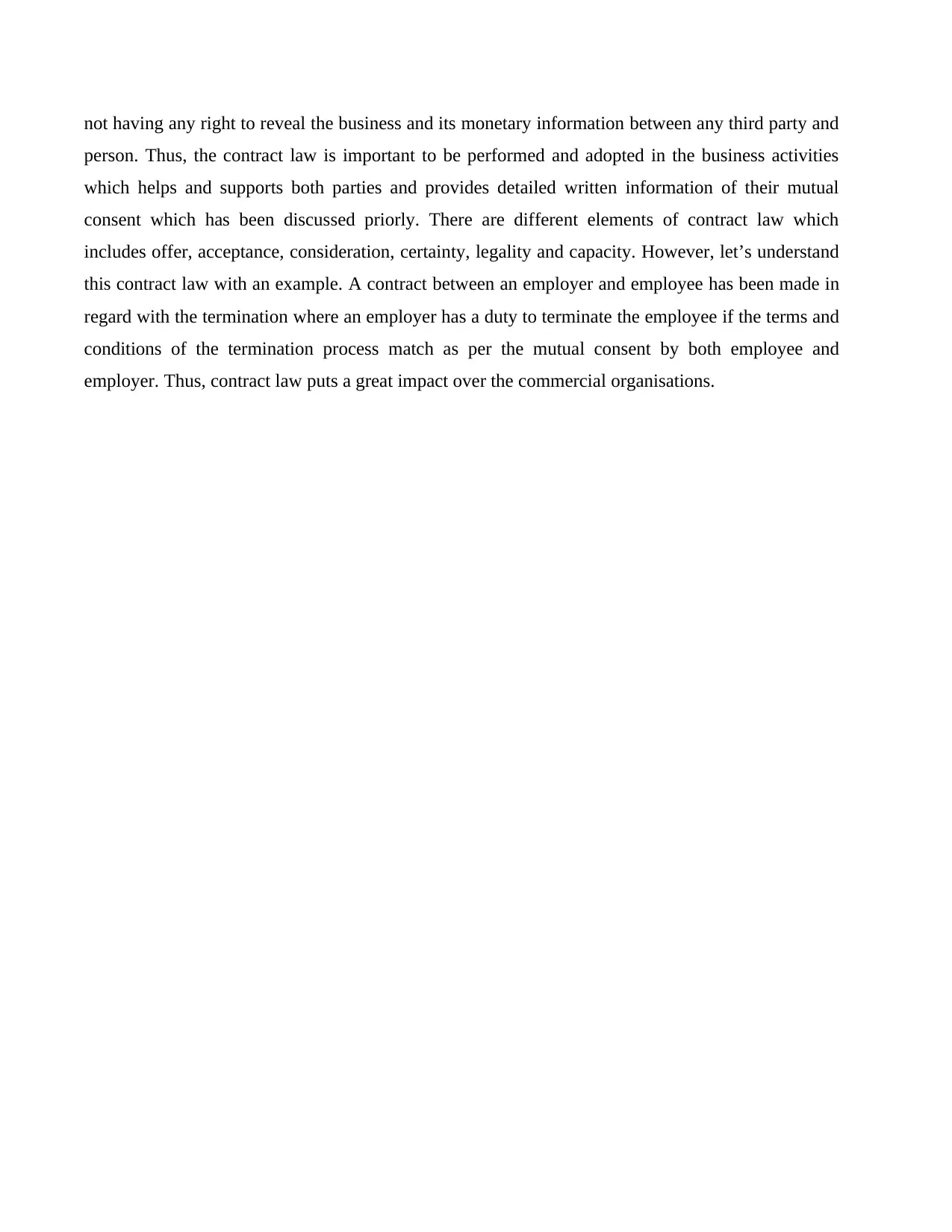
not having any right to reveal the business and its monetary information between any third party and
person. Thus, the contract law is important to be performed and adopted in the business activities
which helps and supports both parties and provides detailed written information of their mutual
consent which has been discussed priorly. There are different elements of contract law which
includes offer, acceptance, consideration, certainty, legality and capacity. However, let’s understand
this contract law with an example. A contract between an employer and employee has been made in
regard with the termination where an employer has a duty to terminate the employee if the terms and
conditions of the termination process match as per the mutual consent by both employee and
employer. Thus, contract law puts a great impact over the commercial organisations.
person. Thus, the contract law is important to be performed and adopted in the business activities
which helps and supports both parties and provides detailed written information of their mutual
consent which has been discussed priorly. There are different elements of contract law which
includes offer, acceptance, consideration, certainty, legality and capacity. However, let’s understand
this contract law with an example. A contract between an employer and employee has been made in
regard with the termination where an employer has a duty to terminate the employee if the terms and
conditions of the termination process match as per the mutual consent by both employee and
employer. Thus, contract law puts a great impact over the commercial organisations.
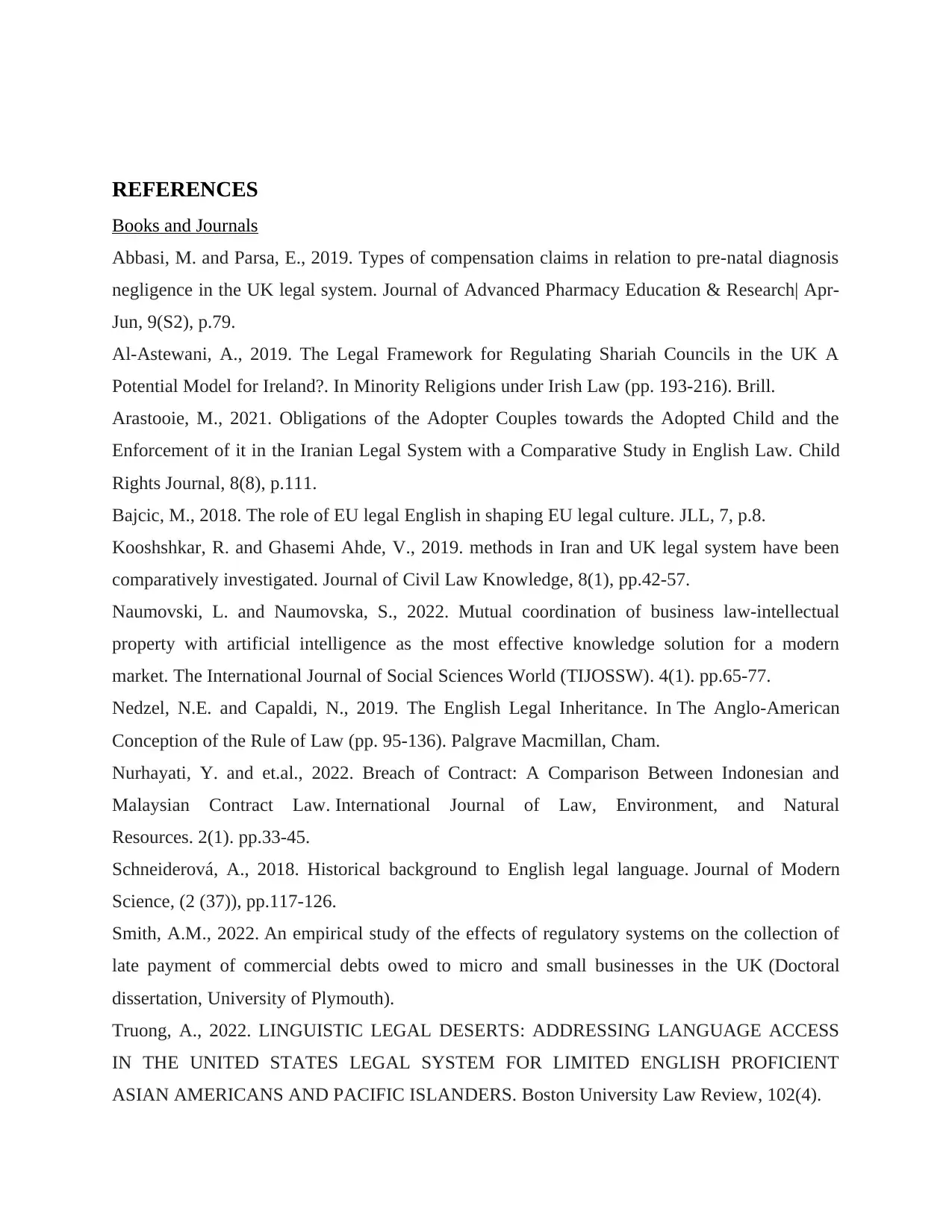
REFERENCES
Books and Journals
Abbasi, M. and Parsa, E., 2019. Types of compensation claims in relation to pre-natal diagnosis
negligence in the UK legal system. Journal of Advanced Pharmacy Education & Research| Apr-
Jun, 9(S2), p.79.
Al-Astewani, A., 2019. The Legal Framework for Regulating Shariah Councils in the UK A
Potential Model for Ireland?. In Minority Religions under Irish Law (pp. 193-216). Brill.
Arastooie, M., 2021. Obligations of the Adopter Couples towards the Adopted Child and the
Enforcement of it in the Iranian Legal System with a Comparative Study in English Law. Child
Rights Journal, 8(8), p.111.
Bajcic, M., 2018. The role of EU legal English in shaping EU legal culture. JLL, 7, p.8.
Kooshshkar, R. and Ghasemi Ahde, V., 2019. methods in Iran and UK legal system have been
comparatively investigated. Journal of Civil Law Knowledge, 8(1), pp.42-57.
Naumovski, L. and Naumovska, S., 2022. Mutual coordination of business law-intellectual
property with artificial intelligence as the most effective knowledge solution for a modern
market. The International Journal of Social Sciences World (TIJOSSW). 4(1). pp.65-77.
Nedzel, N.E. and Capaldi, N., 2019. The English Legal Inheritance. In The Anglo-American
Conception of the Rule of Law (pp. 95-136). Palgrave Macmillan, Cham.
Nurhayati, Y. and et.al., 2022. Breach of Contract: A Comparison Between Indonesian and
Malaysian Contract Law. International Journal of Law, Environment, and Natural
Resources. 2(1). pp.33-45.
Schneiderová, A., 2018. Historical background to English legal language. Journal of Modern
Science, (2 (37)), pp.117-126.
Smith, A.M., 2022. An empirical study of the effects of regulatory systems on the collection of
late payment of commercial debts owed to micro and small businesses in the UK (Doctoral
dissertation, University of Plymouth).
Truong, A., 2022. LINGUISTIC LEGAL DESERTS: ADDRESSING LANGUAGE ACCESS
IN THE UNITED STATES LEGAL SYSTEM FOR LIMITED ENGLISH PROFICIENT
ASIAN AMERICANS AND PACIFIC ISLANDERS. Boston University Law Review, 102(4).
Books and Journals
Abbasi, M. and Parsa, E., 2019. Types of compensation claims in relation to pre-natal diagnosis
negligence in the UK legal system. Journal of Advanced Pharmacy Education & Research| Apr-
Jun, 9(S2), p.79.
Al-Astewani, A., 2019. The Legal Framework for Regulating Shariah Councils in the UK A
Potential Model for Ireland?. In Minority Religions under Irish Law (pp. 193-216). Brill.
Arastooie, M., 2021. Obligations of the Adopter Couples towards the Adopted Child and the
Enforcement of it in the Iranian Legal System with a Comparative Study in English Law. Child
Rights Journal, 8(8), p.111.
Bajcic, M., 2018. The role of EU legal English in shaping EU legal culture. JLL, 7, p.8.
Kooshshkar, R. and Ghasemi Ahde, V., 2019. methods in Iran and UK legal system have been
comparatively investigated. Journal of Civil Law Knowledge, 8(1), pp.42-57.
Naumovski, L. and Naumovska, S., 2022. Mutual coordination of business law-intellectual
property with artificial intelligence as the most effective knowledge solution for a modern
market. The International Journal of Social Sciences World (TIJOSSW). 4(1). pp.65-77.
Nedzel, N.E. and Capaldi, N., 2019. The English Legal Inheritance. In The Anglo-American
Conception of the Rule of Law (pp. 95-136). Palgrave Macmillan, Cham.
Nurhayati, Y. and et.al., 2022. Breach of Contract: A Comparison Between Indonesian and
Malaysian Contract Law. International Journal of Law, Environment, and Natural
Resources. 2(1). pp.33-45.
Schneiderová, A., 2018. Historical background to English legal language. Journal of Modern
Science, (2 (37)), pp.117-126.
Smith, A.M., 2022. An empirical study of the effects of regulatory systems on the collection of
late payment of commercial debts owed to micro and small businesses in the UK (Doctoral
dissertation, University of Plymouth).
Truong, A., 2022. LINGUISTIC LEGAL DESERTS: ADDRESSING LANGUAGE ACCESS
IN THE UNITED STATES LEGAL SYSTEM FOR LIMITED ENGLISH PROFICIENT
ASIAN AMERICANS AND PACIFIC ISLANDERS. Boston University Law Review, 102(4).
⊘ This is a preview!⊘
Do you want full access?
Subscribe today to unlock all pages.

Trusted by 1+ million students worldwide
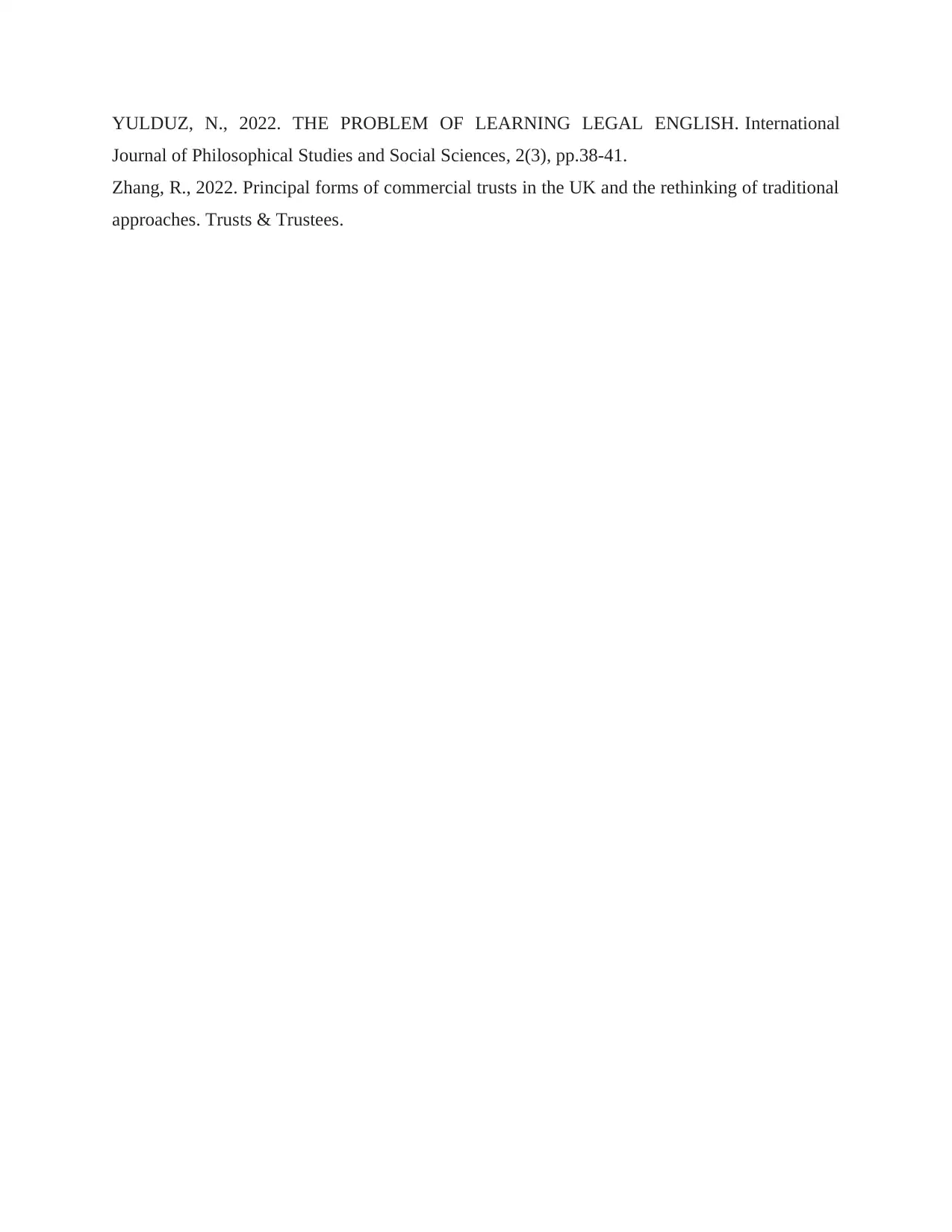
YULDUZ, N., 2022. THE PROBLEM OF LEARNING LEGAL ENGLISH. International
Journal of Philosophical Studies and Social Sciences, 2(3), pp.38-41.
Zhang, R., 2022. Principal forms of commercial trusts in the UK and the rethinking of traditional
approaches. Trusts & Trustees.
Journal of Philosophical Studies and Social Sciences, 2(3), pp.38-41.
Zhang, R., 2022. Principal forms of commercial trusts in the UK and the rethinking of traditional
approaches. Trusts & Trustees.
1 out of 10
Related Documents
Your All-in-One AI-Powered Toolkit for Academic Success.
+13062052269
info@desklib.com
Available 24*7 on WhatsApp / Email
![[object Object]](/_next/static/media/star-bottom.7253800d.svg)
Unlock your academic potential
Copyright © 2020–2026 A2Z Services. All Rights Reserved. Developed and managed by ZUCOL.




